

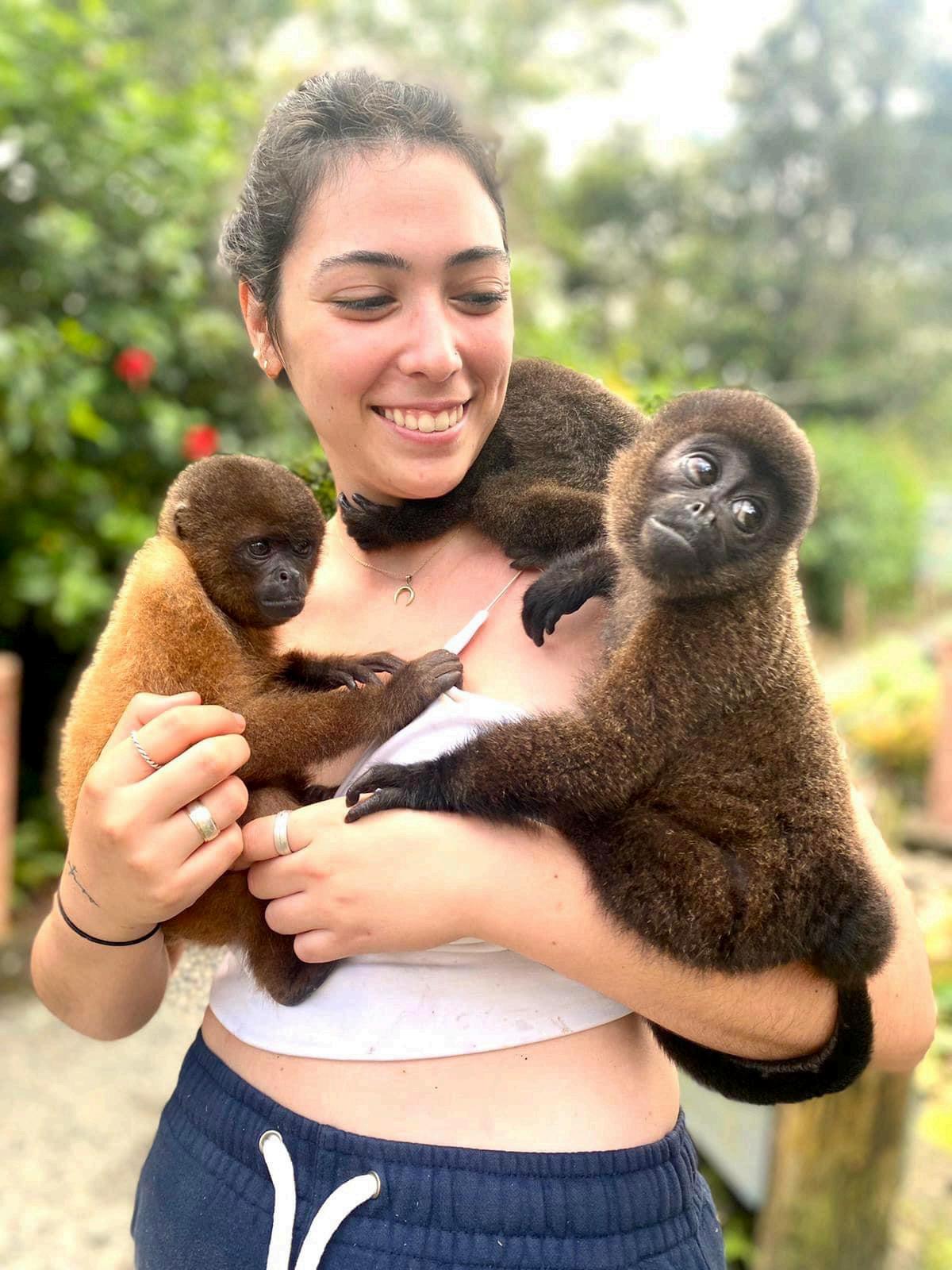










a unique jungle experience dedicated to caring for injured animals, nursing them back to health, and preparing them for a return to their natural habitat.
Founded in 2006, this center is committed to safeguarding Amazonian wildlife through the rescue and rehabilitation of local flora and fauna.
Immerse yourself in a unique jungle experience dedicated to caring for injured animals, nursing them back to health, and preparing them for a return to their natural habitat Founded in 2006, this center is committed to safeguarding Amazonian wildlife through the rescue and rehabilitation of local flora and fauna.
The animals at the center have faced abuse, neglect, or abandonment. Many were orphaned when their parents were killed by hunters, rescued from traffickers, or removed from captivity where they were kept as pets. Sadly, most have endured physical or psychological trauma.
Some animals are handed over by government authorities, while others arrive voluntarily from families who realize that wild animals do not belong in domestic settings Currently, the center cares for at least 40 different species, including ocelots, tayras, capybaras, parrots, Red and Yellow Macaws, Red Titi Monkeys, White-bellied Spider Monkeys, tortoises, and caimans
Open to tourists with a small entrance fee, the center also relies on this income for support. This project provides a unique opportunity for volunteers to work hands-on with wild animals while living in the stunning Amazon rainforest.

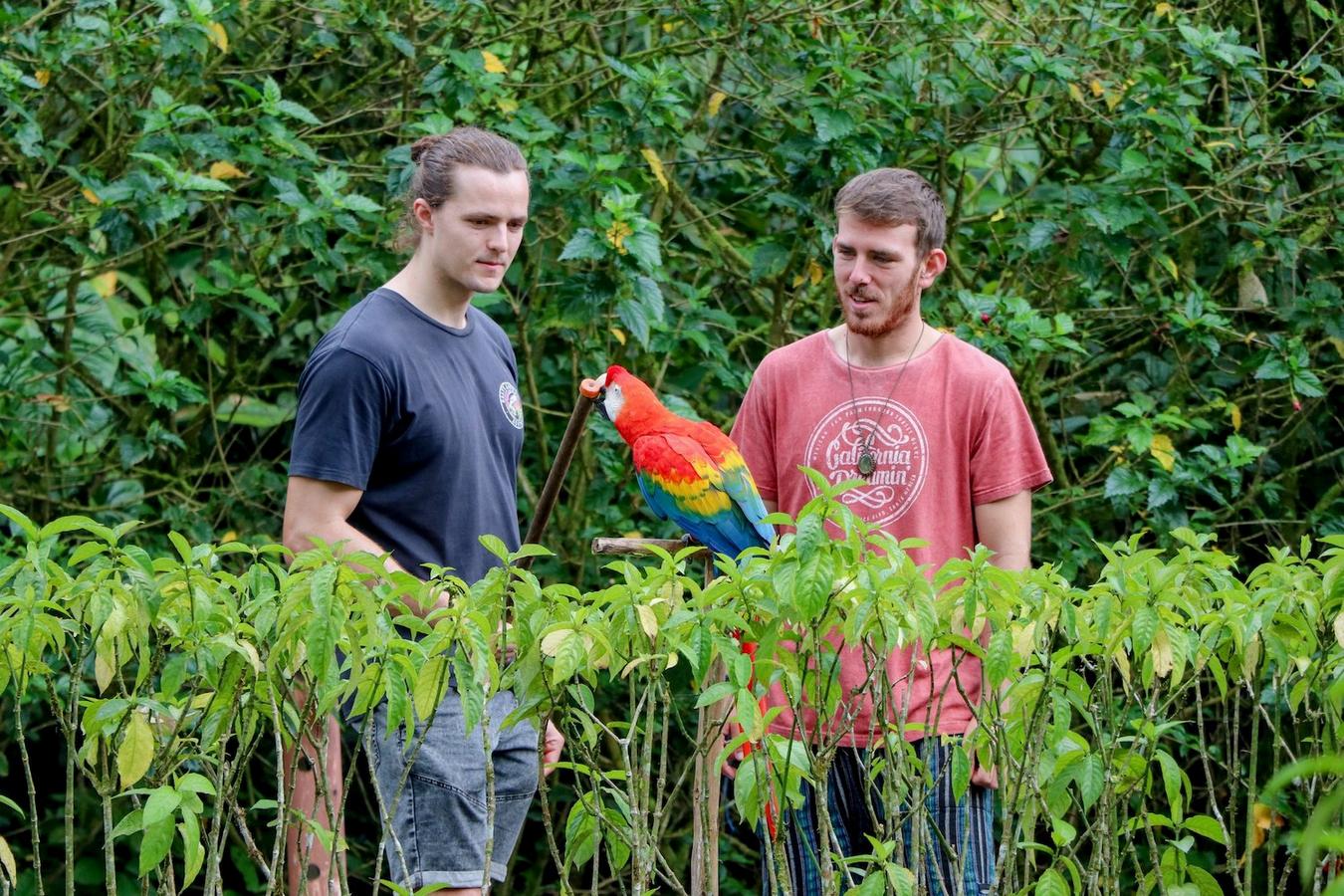
ArrivalProject: Quito (UIO)
Location: 15 minutes by car from Puyo
StartDate: Volunteers need to be at the project on Sunday to start on Monday
Wi-Fi: Poor connectivity
PhysicalDemands: Work can be physically demanding
MaximumVolunteers: 17 at the same time
Vaccinations: Tetanus, Hepatitis A, and B vaccines are highly recommended
Climate: Located in the Amazon with a humid, hot climate andfrequentrain; working under these conditions is challenging
VolunteerTraits: Must be responsible, disciplined, hardworking, motivated, team-oriented, flexible, patient, and proactive
Facilities: ATMs and a hospital are available in Puyo Budget: Suggested weekly budget of $80 for meals during weekends and tours
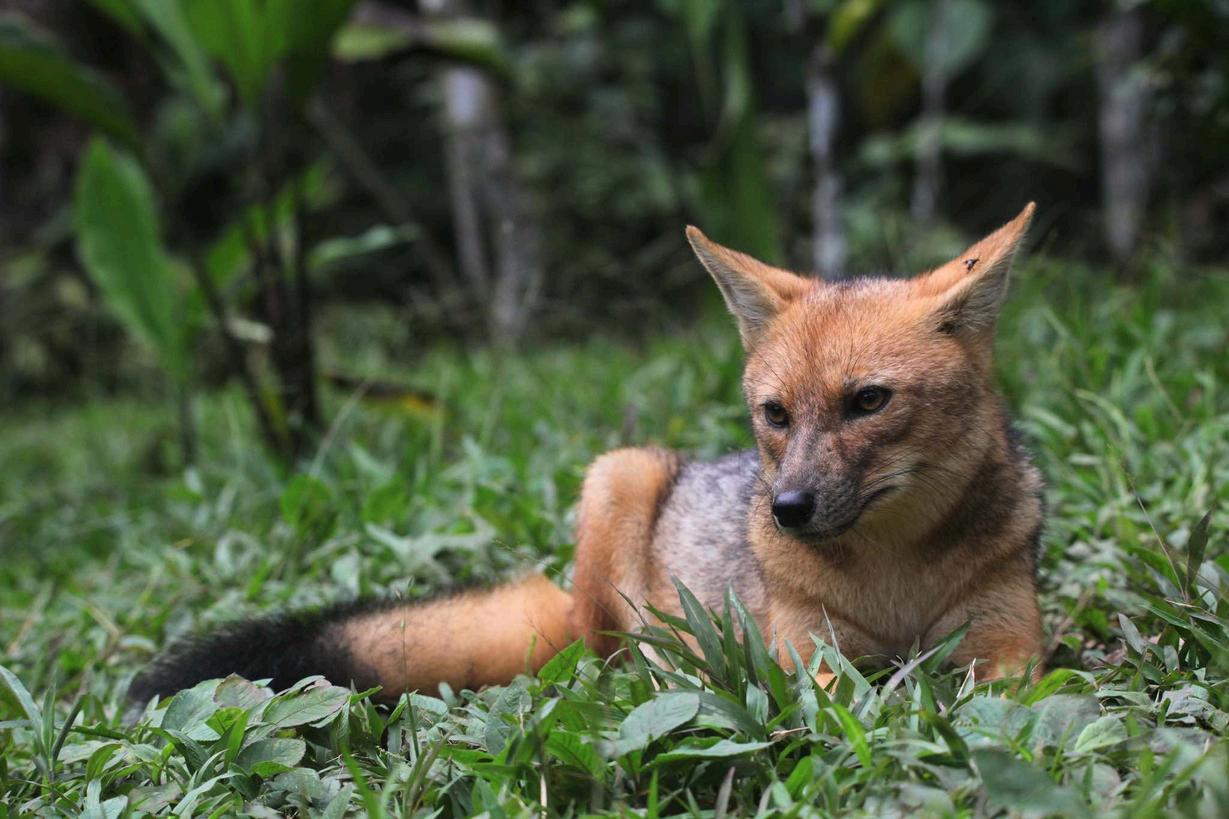
MEALS DURING WEEK END
MEDICAL INSURANCE (MANDATORY TO CONFIRM THE RESERVATION) TRANSPORT TO THE PROJECT PERSONAL EXPENSES
Each activity contributes to the well-being of the animals and the smooth operation of the center!
Here’s what you might be doing:

Daily Animal Care: Attend to the everyday needs of the animals.
Diet Prep and Feeding: Cut up fruit, prepare diets, and feed the animals.
Help New Arrivals: Assist new animals in adjusting to the center.
General Maintenance: Take care of maintenance and cleaning tasks around the center.
Construction Work: Repair and build new enclosures to improve facilities.
Enrichment Activities: Enhance cages and enclosures to keep animals engaged.
Training: Train animals that cannot be released to reduce stress, especially during medical checks.
Vet Assistance: Support the vet when needed.
Additional Tasks: Engage in gardening, improve trails, and create signs for visitors.
On your first working day, you’ll have an orientation meeting where we’ll outline the activities for the upcoming days. We’ll also discuss your expectations and explore your talents and passions to ensure your volunteer work is impactful for both the project and yourself.
After the orientation, it’s time to get to work. Be aware that no two days will be the same, and your tasks will vary based on daily needs. We appreciate your flexibility to assist wherever necessary.
Lunch is served at the project from Monday to Friday, providing you a break around midday. You’ll continue with your duties until approximately 5 pm. The rest of the day is free for you to enjoy.
Your schedule will follow a similar pattern for the rest of the week, with work from 8 am to 5 pm, Monday through Friday The coordinator will direct you where you’re needed most, and we welcome any ideas you may have!
On Saturdays or Sundays, once every two weeks, volunteers work a few hours in the morning to feed animals. The remaining weekend days are free for you to explore and relax.


Here’s how you can unwind after volunteering:
Relax and recharge: Kick back with a book in a hammock or play board and card games with fellow volunteers.
Explore Puyo: Just 15 minutes away by car, Puyo offers a quick getaway for some local flavor.
Adventure in Baños: About 1 hour and 20 minutes by bus, Baños is a hotspot for extreme sports and fun. You can enjoy thermal baths, dance the night away, or try mountain biking, rafting, canopying, and exploring waterfalls near the active Tungurahua volcano.
Jungle tour in Tena: Venture 2 hours to Tena for an authentic jungle experience.
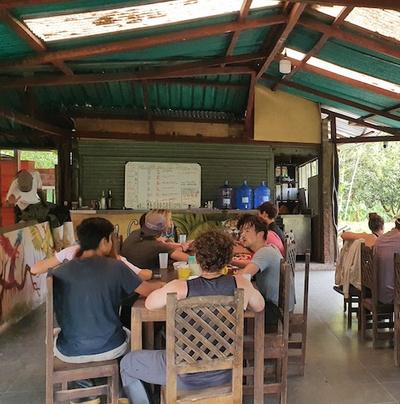
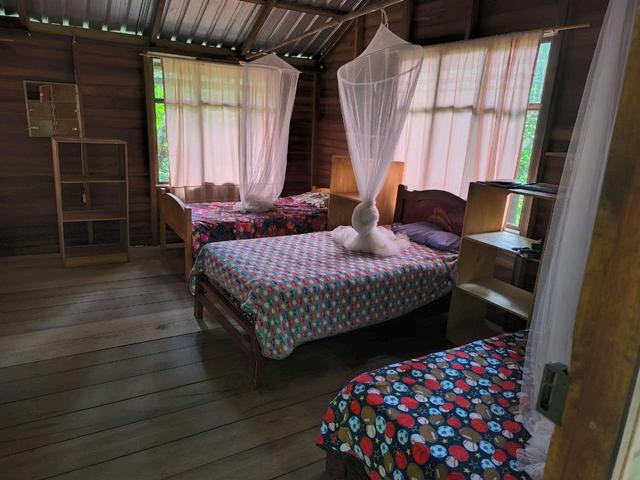
The volunteer cabañas at the Animal Rescue Center provide dorm-style rooms that accommodate up to 17 people You'll have access to a shared kitchen and bathroom, along with a social area equipped with a TV, DVD player, hammocks, and a selection of books. The accommodation is simple but comfortable, fostering a communal atmosphere among volunteers
In addition to the basic amenities, you'll find a communal kitchen where you can prepare meals or join in cooking with fellow volunteers The bathroom facilities are shared, so make sure to be considerate of others. The social area is a great spot to unwind after a day’s work, whether you want to watch a movie, read a book, or relax in a hammock.

Perfect for exploring the surrounding rainforest. Easily reachable from Baños, Puyo serves as a gateway to the E30 route, which connects the Amazon with the highlands and the Pacific Coast. Historically, this route has been vital for transporting Amazonian products like cacao beans and yucca
The town is home to several native tribes, including the Waorani, Kichwa, Zápara, and Shuar. Notably, the Zápara tribe, spanning Ecuador and Peru, has been honored by UNESCO for their exceptional cultural and oral traditions, recognized as a masterpiece of the “Intangible Heritage of Humanity.” In Puyo, you can experience the rich cultural tapestry and vibrant natural beauty of the Amazon.
The climate in Puyo is typically hot and humid, with an average temperature of around 25°C to 27°C. The region enjoys a tropical rainforest climate, characterized by frequent rainfall and high humidity throughout the year, contributing to its lush greenery and vibrant ecosystem.
Comfortable clothing (at least 3 changes of work clothes)
Rain jacket (rain trousers also recommended)
Rubber boots (you can buy them in Quito; if your shoe size is over 40, bring them with you)
Insect repellent
Mosquito net
Sunscreen (min factor 50)
Pocketknife
Sunglasses
A hat for sun protection
Flashlight/headlight
Sleeping bag (not necessary but recommended)
Useful items for the center (e.g., fabrics, old clothes, brushes, medicine for animals and humans, gloves for handling animals)
Personal hygiene items (including toilet paper)
Power converter for 110v sockets
Travel documents (passport, copy of medical insurance, personal medication information, vaccine card)
Please remember to bring enough of your own medications for the entire duration of your stay with us There are no pharmacies close by and having your personal medication with you is essential
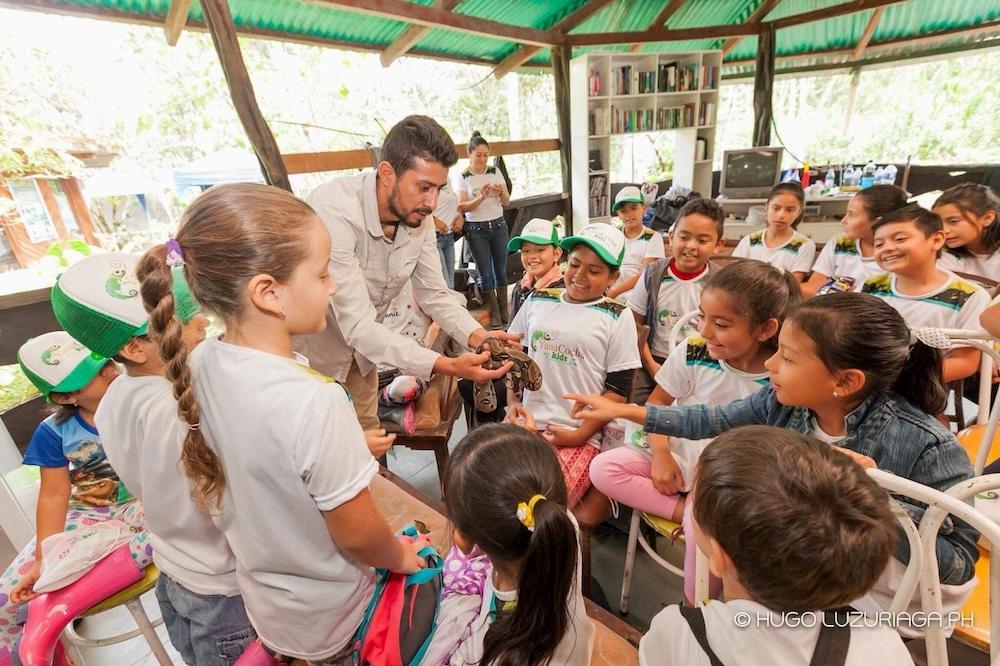

Volunteering is an exciting journey to personal growth and self-discovery. When you dive into mindfulness volunteering, it's not just about helping others it's about exploring, learning, and really understanding yourself and the world It's all about staying open-minded, living in the moment, and being tuned in to what's happening around you.
Mindfulness practices aren't just for yoga class they're about developing a mindset that boosts both your personal and professional life They help you accept things you can't control and build up your own trust. Plus, they teach you to be generous and thankful for every bit of life's goodness.
Remember, changing the world starts with changing yourself. So jump in and see where this journey takes you! 121
You cannot change the world if you don't change yourself


